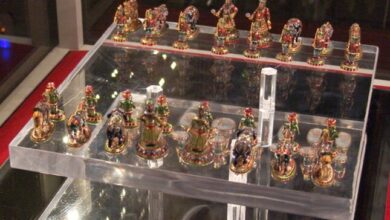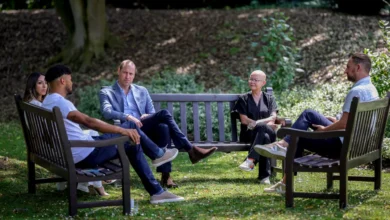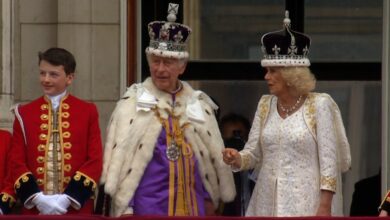Al-Masry Al-Youm paid a visit to Akram el-Naqeeb, son of Queen Nariman, Egypt’s last reigning queen. In his office in Alexandria’s famous Mahattet el-Raml square, el-Naqeeb spoke about his mother, brother and the royal legacy.
Al-Masry Al-Youm: Was your mother sufficiently honored during her lifetime?
Akram el-Naqeeb: No, I’m sorry to say that she wasn’t.
Al-Masry: Did this make her bitter?
El-Naqeeb: No, she was that reserved type that never complains under any circumstances. But things have changed over the past five years. People have begun to realize the significance of that era in Egypt’s history. This may have made her a little happier. She was also well-received by people wherever she went.
Al-Masry: There are plans underway to build a museum in her honor at Abdeen Palace. Do you know anything about this?
El-Naqeeb: I know nothing about this except from the press. None of the officials at the Culture Ministry have talked to me about it. Anyway, if they have the intention to build such a museum, then a committee of members of the Supreme Council for Culture, the Supreme Council of Antiquities and the General Administration of Museums should be appointed.
This committee should also include historians, her relatives and members of her family, of whom only my brother, King Ahmed Fouad, and myself are still alive. I’m the closest to her, but nobody has relayed the news to me.
Al-Masry: Perhaps the committee has spoken with your brother.
El-Naqeeb: Maybe. But they should have talked with me, because I have been closer to her since my brother chose to live away from her. Currently, I’m the closest remaining member of her family, and I have her possessions and documents.
Al-Masry: Why don’t you contact this committee and present it with the Queen’s possessions?
El-Naqeeb: I possess a national legacy, so I have to be confident that it will be in safe hands. History tells us that a lot of valuable property was plundered. I need official reassurances that whatever I hand in will be recorded in official books.
Al-Masry: So you’re ready to provide these possessions but are suspicious of how they will handled?
El-Naqeeb: Yes. I’m currently taking good care of them. I just need guarantees they will be in safe hands.
Al-Masry: What are the most important objects in your possession?
El-Naqeeb: There are many documents, letters written in her own handwriting, bags full of documents that I have not yet sorted out, along with thousands of photographs.
Al-Masry: Do you have her diary?
El-Naqeeb: No, she didn’t keep a diary. She would only pen her thoughts and ideas from time to time.
Al-Masry: Have you thought about compiling these thoughts in a book?
El-Naqeeb: I’m very busy. All I could do was create a huge website for her.
Al-Masry: Besides the documents and photos, do you have any heirlooms, such as royal jewelry?
El-Naqeeb: No, none. When the revolution erupted, the royal family was in Montazah, while their possessions were at the palace in Cairo. My mother had only some jewelry with her. She was later forced to sell these to make ends meet.
Al-Masry: Why has your mother avoided the limelight all these years?
El-Naqeeb: She generally doesn’t like to make public appearances. Her relationships were restricted to family.
Al-Masry: Did she ever talk about her fiance, Zaki Hashem, to whom she was engaged before marrying King Farouk?
El-Naqeeb: She has not talked a lot about him. They only met a few times at culture salons or celebrations. Their meetings were of a transient nature.
Al-Masry: How would you describe her relationship with Queen Farida?
El-Naqeeb: Normal; they used to greet each other on holidays. When Queen Farida inaugurated her first art gallery in Cairo, my mother was keen on visiting it. They even took a photo together on that occasion. Their relationship is one of love and respect.
Al-Masry: Lotus Abdel Karim recently said that Queen Farida had returned to King Farouk after their divorce. Do you know anything about this?
El-Naqeeb: It’s the first time for me to hear that. Is there any official proof of that? If that really happened, then Princess Feryal, their daughter, must know about it. She’s the only one who has the right to make such a pronouncement.
But I don’t think this happened. They could not have possibly got married in secret, because this would have led to rumors. Besides, if it were true, we would have known about it long ago.
Al-Masry: What news is there of your brother, King Ahmed Fouad?
El-Naqeeb: I hope he is fine and that his latest visit to Egypt will encourage him to settle here.
Al-Masry: Do you think this is a possibility?
El-Naqeeb: I think he realized during his latest visit that he can come back to Egypt and live here in peace.
Al-Masry: The tone of your voice suggests the two of you are not in contact.
El-Naqeeb: Not at all. We’re just busy. The fact that we don’t meet regularly doesn’t mean we’re not brothers.
Translated from the Arabic Edition.




